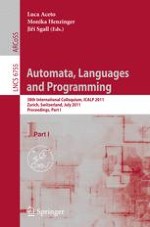2011 | OriginalPaper | Chapter
New Algorithms for Learning in Presence of Errors
Authors : Sanjeev Arora, Rong Ge
Published in: Automata, Languages and Programming
Publisher: Springer Berlin Heidelberg
Activate our intelligent search to find suitable subject content or patents.
Select sections of text to find matching patents with Artificial Intelligence. powered by
Select sections of text to find additional relevant content using AI-assisted search. powered by
We give new algorithms for a variety of randomly-generated instances of computational problems using a
linearization
technique that reduces to solving a system of linear equations.
These algorithms are derived in the context of learning with
structured
noise, a notion introduced in this paper. This notion is best illustrated with the
learning parities with noise
(LPN) problem —well-studied in learning theory and cryptography. In the standard version, we have access to an oracle that, each time we press a button, returns a random vector
$ {a} \in \mbox{GF}(2)^n$
together with a bit
$b \in \mbox{GF}(2)$
that was computed as
a
·
u
+
η
, where
${u}\in \mbox{GF}(2)^n$
is a
secret
vector, and
$\eta \in \mbox{GF}(2)$
is a
noise
bit that is 1 with some probability
p
. Say
p
= 1/3. The goal is to recover
u
. This task is conjectured to be intractable.
In the structured noise setting we introduce a slight (?) variation of the model: upon pressing a button, we receive (say) 10 random vectors
${a_1}, {a_2}, \ldots, {a_{10}} \in \mbox{GF}(2)^n$
, and corresponding bits
b
1
,
b
2
, …,
b
10
, of which at most 3 are noisy. The oracle may arbitrarily decide which of the 10 bits to make noisy. We exhibit a polynomial-time algorithm to recover the secret vector
u
given such an oracle. We think this structured noise model may be of independent interest in machine learning.
We discuss generalizations of our result, including learning with more general noise patterns. We also give the first nontrivial algorithms for two problems, which we show fit in our structured noise framework.
We give a slightly subexponential algorithm for the well-known
learning with errors
(LWE) problem over
$\mbox{GF}(q)$
introduced by Regev for cryptographic uses. Our algorithm works for the case when the gaussian noise is small; which was an open problem. Our result also clarifies why existing hardness results fail at this particular noise rate.
We also give polynomial-time algorithms for learning the MAJORITY OF PARITIES function of Applebaum et al. for certain parameter values. This function is a special case of Goldreich’s pseudorandom generator.
The full version is available at
http://www.eccc.uni-trier.de/report/2010/066/
.
